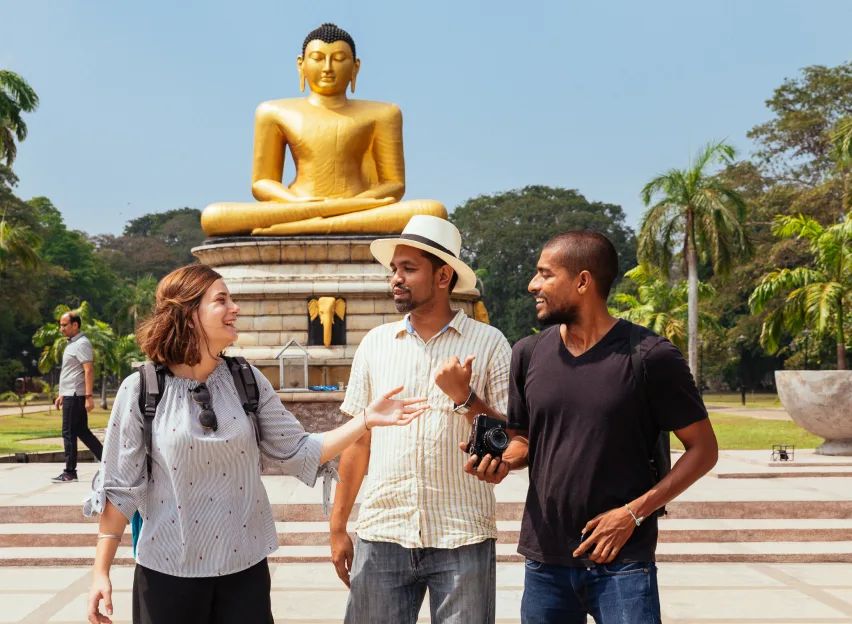
You don’t have to be an amazing language learner in Tamil or Sinhala to enjoy your vacation in Sri Lanka! You’ll be able to communicate in English. Saying a few things in their language will be greatly appreciated by the Sri Lankan people, though.
Sri Lanka has two official languages: Tamil and Sinhala. While Tamil is virtually solely spoken in the island’s northern and eastern regions, Sinhala is extensively spoken throughout the island’s southern, western, and central regions.
Tamil and Sinhala are the two official languages of the nation; Sinhala’s alphabet, which consists of 52 letters that have no correspondence to the Latin alphabet, is one of them. If you have to pick just one language to study before visiting Sri Lanka, it must be Sinhala. Approximately 75% of people speak it. As a result, you will have greater opportunities to use it than Tamil, which is only spoken by 25% of Sri Lankans.
It will be quite tough for you to learn much more than the usual greetings and a few common words, which is, to be honest, fairly complex to learn any of them.
You can respect your hosts by even knowing how to say “hello,” “ayubowan” in Sinhala, and “vanakkam” in Tamil. They will be grateful that you took the time to learn these words. It can also be beneficial to learn how to count, especially since it’s not that hard.
Five million people, or roughly 15% of the island’s population, speak Tamil, which is the country’s second official language. Tamil is a member of the Dravidian language family, which is widely spoken in Tamil Nadu and other southern Indian states. Since ancient times, Tamil has been spoken in Sri Lanka due to the influence of foreign kings, traders, invaders, and immigrants.
There are other minority languages that are spoken by a small number of people besides Tamil and Sinhala. The most well-known of these minority languages is Veddah, which is spoken by a tribe of hunter-gatherers from central Sri Lanka who consider the forests home. There are many terms in both Veddah and Sinhala that have been borrowed from one another. Additionally, the Rodiya group in the Hill Country speaks a language that is occasionally referred to as a Sinhala dialect. The Tamil spoken by the Moors of Sri Lanka is strongly impacted by Arabic. Speaking a combination of Arabic, Tamil, Sinhala, and Bahasa Malaysia, the Malay Muslims of Sri Lanka speak Creole Malay.
Since the majority of Sri Lankans can speak English, communication problems are unlikely to arise. English is taught as a second language in schools to Sri Lankan students beginning in the primary grades. Sri Lankan English is basically British English with a dash of colloquial terms and expressions. Because of the accent and terms that are borrowed from other languages, native English speakers may find Sri Lankan English difficult to understand.
Switching to English

It is only right to inform you that you will never be able to hold a meaningful conversation in Tamil or Sinhala, no matter how hard you try. However, 15% or so of the populace speaks English. For the majority of people who interact with tourists, this is the situation. Thus, you’re in luck! It will always be understood where you go. Thus, you will be able to take full advantage of these amazing opportunities, particularly because Sri Lankans are often exceedingly hospitable. They enjoy practising their English and having conversations with guests.
It might be difficult to learn a new language in a short amount of time, and it can seem impossible to grasp the language completely in a few days. Rather than trying to learn every word in the language, pick a few essential phrases that will come in handy most of the time, and then pick up more as you go.
Here are some handy phrases in Sinhalese:
- Hello - Ayubowan.
- How are you? – Kohomada?
- What’s your name? – Oyāgē nama mokakda?
- My name is __. – Magē nama __.
- How much is this? – Meyka keeyada?
- Thank you. – Stuuti.

In addition to Sinhala and Tamil, English is also extensively spoken and utilised in Sri Lanka, particularly in urban areas, for official purposes. This is a result of the nation’s colonial heritage under the British Empire, when English was adopted as the official language for trade, education, and administration.
The majority of Sri Lankan schools and institutions still use English as their medium of instruction, and it is a requirement for those pursuing professional or advanced degrees. The Chinese community in Sri Lanka, which is mostly engaged in trade and commerce, speaks Chinese. The Muslim population of Sri Lanka, which dates back to the 7th century, is multilingual and speaks Arabic.
It is significant to remember that language use in Sri Lanka differs according to social context, ethnicity, and geography. For instance, Tamil is the most widely used language in daily life in the Northern and Eastern provinces of Sri Lanka, where the majority of the Tamil-speaking people reside, whereas Sinhala is more widely used across the remainder of the nation.
People who speak a combination of Sinhala, Tamil, and English, depending on the situation, are known to be multilingual or even trilingual in some parts of the nation. All things considered, one of Sri Lanka’s best assets is its language diversity, which is a reflection of the nation’s rich historical and cultural legacy. There are plenty of chances to become fully immersed in the language and culture of this stunning nation, regardless of your interest in learning English, Tamil, or Sinhala.
Learning the Language in Sri Lanka

Travelling in Sri Lanka can be greatly enhanced by learning the local language, as the country has a rich and diverse culture. In addition to making it easier for you to interact with the locals, it also gives you a better understanding of their traditions, habits, and beliefs. Understanding the local language will help you establish a deeper connection with the people and places you encounter, whether you are interested in touring the historic monuments of Anuradhapura or taking in the breathtaking natural beauty of Ella.
Reaching out to local language enthusiasts or searching through social media groups and online forums are good ways to uncover language exchange programs. There are plenty of internet resources accessible for studying Sri Lankan native languages for people who would rather study on their own. Websites like Duolingo, Rosetta Stone, and Mango Languages provide language learning courses designed with travellers’ requirements in mind.
With the aid of interactive courses, practice tests, and audio recordings offered by these applications, you can advance your language proficiency at your own pace.
There are Sinhala to Tamil translators in Sri Lanka who can help you get over language obstacles if you need assistance with translation or interpretation. These translators are available for hiring online through freelance platforms or through translation firms.
All things considered, anybody visiting Sri Lanka should make the investment in learning the language. It can assist you in overcoming cultural obstacles, developing close relationships with locals, and developing a greater appreciation and understanding of the way of life there. There is no reason not to start along the path to language proficiency now that there are so many possibilities for language learning.
Do people speak English in Sri Lanka?

In Sri Lanka, English is commonly spoken and understood, particularly by younger people and in urban areas. The colonial past of the nation—Sri Lanka was controlled by the British for more than a century before obtaining independence in 1948—is mostly to blame for this.
Since English was the language of instruction and government throughout this time, a large number of Sri Lankans are fluent in it. English is still utilized in commerce, government, and tourism today, so it’s crucial for both residents and tourists to be able to communicate in it.
It’s crucial to remember that social context and geographic location have an impact on English competence. Although many Sri Lankans in metropolitan regions may be fluent in English, it’s possible that people in rural areas haven’t had the same opportunities or exposure to the language.
Furthermore, older generations might not speak English as well because they attended school when Tamil and Sinhala were the main languages of instruction. Overall, even with these variances, English is still a language that is frequently used and that visitors to Sri Lanka should be familiar with.
It is also important to remember that, although essential, English is not the sole language spoken in Sri Lanka. The majority of people in Sri Lanka speak Tamil, which is the official language of the country, whereas the majority speak Sinhala.
It is also important to remember that, although essential, English is not the sole language spoken in Sri Lanka. The majority of people in Sri Lanka speak Tamil, which is the official language of the country, whereas the majority speak Sinhala. Acquiring even a few phrases in these languages can improve your trip experience and foster a stronger sense of cultural immersion. Furthermore, minority populations in Sri Lanka speak a wide variety of additional languages, including Arabic, Chinese, and Malay.
Challenges and Opportunities for Language Learning in Sri Lanka

The linguistic complexity of the local language in Sri Lanka is one of the biggest obstacles to learning it. For non-native speakers, learning the unique alphabets and pronunciations of Sinhala and Tamil can be challenging.
It’s a challenging learning curve for novices because the grammatical structures and lexicon of the two languages differ significantly from one another and from English.
The linguistic entanglement of cultural differences presents another difficulty for language learners in Sri Lanka. The language and culture of Sri Lanka are closely entwined; therefore, studying the language requires an awareness of the subtle cultural differences.
In spite of the difficulties, there are plenty of chances to pick up the local tongue in Sri Lanka. Travellers who take the time to learn the language might obtain a greater understanding of the people and traditions of the country. The language of the country reflects the rich history and unique culture of the nation.

0 Comment